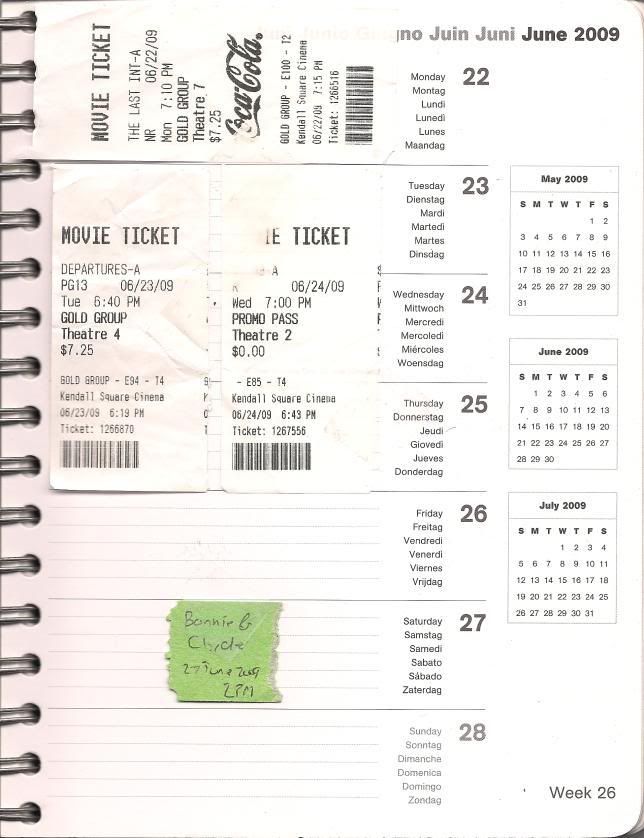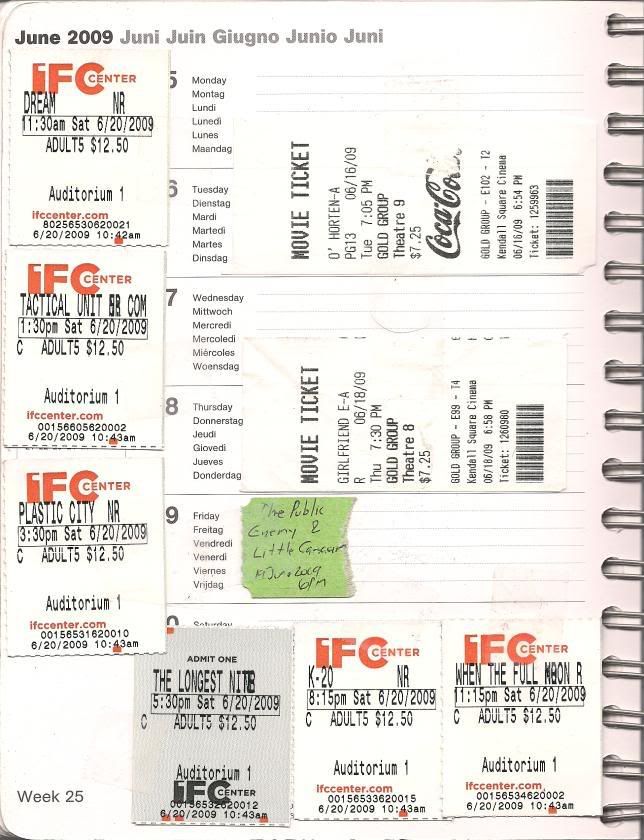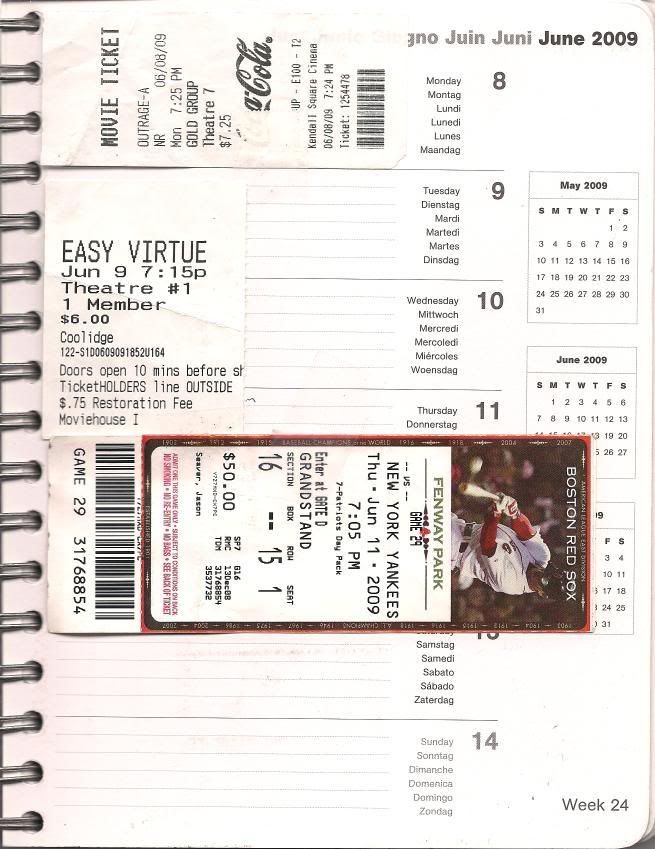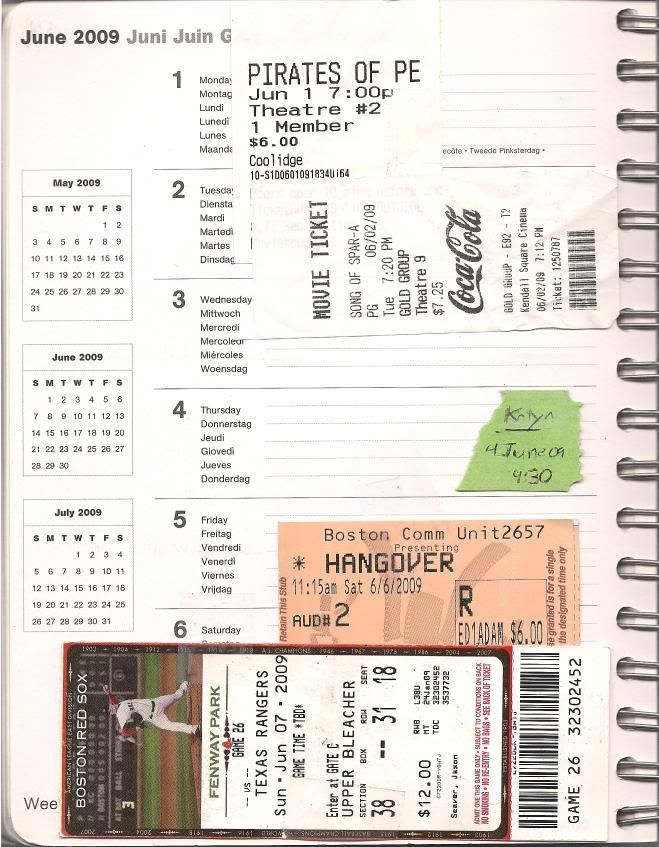Even under the best situations, I tend to eat terribly when attending a film festival, but this was especially annoying. I knew, going in, that I wasn't going to sample much of what NYC has to offer the palate. I knew the day wasn't going to start well - some crud from McDonald's in South Station because I feared how long I might have to wait at Cosi for something closer to cooked to order, and then a popcorn at the theater during the first or second movie.
Organic popcorn, of course, since this is a NYC art-house that charges $12.50/ticket even for not-fest programs, although I don't know that that makes it substantially better or worse than the alternative.
I'd pegged the hour and fifteen minutes between the end of
The Longest Nite and
K-20 for supper, and I hadn't even set the bar that high - I wanted to hit
Peanut Butter & Company, just to say I did, and because I do really like peanut butter. However, the Q&A for the movie went on for almost an hour. And while a bunch of it was quite interesting, I was hungry and finding myself less and less fascinated by Wai Ka-fai's TVB work in the 90s. But, blocked in. By the time it was over, there was no time left between movies, so I got some Reese's Pieces. I probably could have grabbed a slice of pizza or something somewhere, but the candy left me full. Still should have gotten another soda for
When the Full Moon Rises, though, so that the caffeine, need to hit the restroom, and repetitive action of taking a sip would help me keep going through movie number six.
As I mentioned back on
Monday, that last one made me wonder if what makes for a good midnight movie versus a good midnight selection for a festival. It's okay for the former to be a kind of slow, silly, and, honestly, kind of cappy (whether through ineptitude or design); when you go to a midnight movie, you generally do it with a group, you've probably gotten a late start on the day, or been doing other things. The sixth movie of a festival is a different experience; the movie-watching part of your brain is worn out, the seats have become too comfortable, and it's just very difficult to stay alert. That's not even counting how you've probably had a day of seeing how "good" and "fun" have a big overlap, and trying to get real enjoyment out of bad filmmaking is just not going to be that effective.
Granted, I am not the biggest fan of manufactured cult/nostalgia filmmaking in the first place, and I don't get enough sleep under the best conditions, let alone when I'm trying to blitz a festival, but I really think there's something to this - good midnight movies don't necessarily make good festival midnights.
Um Fa (The Longest Nite)* * * (out of four)
Seen 20 June 2009 at the IFC Center #1 (New York Asian Film Festival)
The vast majority of the time, a movie that gets taken away from its writer-director and extensively reworked by the studio is going to be a mess, and
The Longest Nite isn't exactly the movie that bucks that trend. Of course, most of the time the studio has to fit more than five scenes into their new vision. And the fixers are seldom people on the same level as Wai Ka-fai and Johnnie To.
The film opens with a chunk of exposition about the Triad situation in Macau - Mr. Hung is the more established boss, and he's been locked in conflict with Mr. K for some time. Mr. Lung feels this situation is bad for business, so he's coming into town to make them work together. There's a contract out on Mr. Hung, presumably from Mr. K, and a number of hitmen have converged on the island to execute it. This includes Tony (Lau Ching-wan), although he doesn't seem to be actively doing much aside from getting between Mr. K's son Mark (Mark Cheng) and Maggie (Maggie Siu), a waitress at one of the clubs. He's still drawing the attention of Sam (Tony Leung Chiu-wai), a corrupt cop on Mr. Lung's payroll.
If one looks too closely at the parts of the story that involve Triad hierarchy and who's paying who to do what,
The Longest Nite's plot becomes a tangle to rival
The Big Sleep, where the director and screenwriter famously had to phone Raymond Chandler to find out which character killed another (and got an ambiguous answer!). Like
The Big Sleep, fortunately, the details of such things really don't matter so much. The plot is just there to give Tony a reason to skulk around Macao and Sam to chase after him, with various action stops along the way.
And, given that the film has Lau Ching-wan and Tony Leung Chiu-wai in the leads, it's generally going to be a lot of fun to watch. Both portray their characters as smart, capable people and worthy adversaries for one another. Lau does a great job of making Tony a guy who can vanish into a crowd but is also clearly the smartest guy in the room. He deadpans his way through a great many scenes, and at other times gives the blank face that says anything else would give it all away - but he's smirking on the inside. Leung's Sam doesn't display any of that sort of restraint, and he frequently plows scenes like a bull in a china shop. He's a burst of sometimes cocky, sometimes frustrated energy, gleefully sadistic, but never giving the impression that he's so out of control that he should be written off.
We'll never know what Patrick Yau's film would have looked like, but it seems fairly likely that To and Wai did not tone it down too much when they took over. An early scene has Sam enthusiastically smashing the fingers of a potential assassin to be sure he doesn't try anything - and then coming back to do it a little more, just in case. There's a naked, headless corpse in play, and Maggie is introduced vomiting on a customer for no particular reason. The over-the-top stuff doesn't take over the movie, but there's enough so that no particular incident makes the audience wonder what
that was doing in
this movie. The action direction in general is what we've come to expect from Johnnie To - not flashy, but you won't find many wrong steps. The action is also pretty good, especially when there are cars crashing into each other in a way that would make fans of 1970s vehicular mayhem smile.
The one exception to that is the climactic fight scene. In a Q&A afterward, Wai Ka-fai freely admitted that by the time it was shot, the budget was stretched and the film was running short (even with this sequence extended, the film clocks in at less than 85 minutes). It's got one quality bit of mayhem, but is otherwise an example of things not to do: The filmmakers deliberately make it difficult to tell the two characters from one another, and in fact shoot it in such a way that I wasn't sure whether or not Tony Leung Chiu-wai was ever on set, or just looped dialogue for his stunt double.
That winds up being a minor blot on what is otherwise a fine bit of Hong Kong crime. Not bad considering the rocky road it had to the screen. Unfortunately, it has also had a rough time getting on video; even ten years later, a rare festival screening like this is one of the only ways to see it.
Also at HBS.K-20: Kaijin niju menso den (K-20: Legend of the Mask)* * * ½ (out of four)
Seen 20 June 2009 at the IFC Center #1 (New York Asian Film Festival)
Even if 2009 weren't one of the most disappointing summer movie seasons in recent memory, I'd still wish that more foreign popcorn films got released here. I know subtitles can be a tough sell for movies aimed at a broad audience and dubbing can make even a great movie look terrible, but there's got to be some way to put a fun-for-the-whole-family adventure movie like
K-20 in front of audiences that could appreciate its constant invention.
The invention starts from the first minute, when we hear a radio broadcast dated 8 December 1941, announcing... That Japan has signed a peace treaty with the United States and United Kingdom. Imperial Japan never falls, and as we open in 1949, there's a rigid class system still in place in the city of Teito. Master criminal K-20 (
Kaijin Niju Menso Den, "The Fiend with Twenty Faces") tweaks the upper class, who devour coverage of Kogoro Akechi (Toru Nakamura), the police inspector assigned to catch K-20. A mysterious man hires poor circus acrobat Heikichi Endo (Takeshi Kaneshiro) to photograph Akechi's engagement to Countess Yoko Hashiba (Takako Matsu), but that results in Endo being mistaken for K-20 and arrested. It becomes clear that the real K-20 has framed him, but why?
The world of
K-20 can be called retro-futuristic, steampunk, or any number of other things. It's a world where police zeppelins serve as carriers for tiny whirlybird helicopters, Nikola Tesla and Thomas Edison shared a Nobel Prize, Tesla's ideas for wireless transmission of energy may be turned into a weapon, and Heikichi's friend Genji "the Gadget" (Jun Kunimura) can build amazing things out of scraps. It's a world out of the serials, akin to
Sky Captain and the World of Tomorrow, although not quite so mannered in its attempts to evoke a "futuristic forties" feel. The visual effects are maybe not quite so impressive as they might be in a similarly-conceived American picture, but they've got a consistent quality, and do their duty of impressing without overwhelming.
Populating this world with a group of enjoyable characters helps quite a bit. Takeshi Kaneshiro makes for a fun accidental swashbuckler; I'm not sure what kind of actual martial arts skills he has, but he and his stunt doubles sell the acrobatics while also providing plenty of amusing slapstick as he trains to master K-20's skills so that he can confront the man who framed him as an equal. He combines matinee idol looks with Jackie Chan charm. Takoko Matsu is a great leading lady for him; sure, we're telegraphed everything we need to know about Yoko in her first scene (asking a maid if an arranged marriage is really all a woman can look forward to), but she throws herself into that role with gusto, whether gleefully ripping her expensive wedding dress apart, acting spectacularly ignorant of the lower classes' living conditions, or being an excited accomplice later. She's as charming here as she was in
The Hidden Blade, and her giddiness often spreads to the audience. Toru Nakamura does a nice job of making Akechi just a bit insufferable, but not foolish or worthy of disdain.
The rest of the cast is good, too: Young Yuki Imai avoids excessive mugging as Heikichi's "kid brother" Shinsuke, and Kanata Hongo hits the right notes as Akechi's young assistant Yoshio. Jun Kunimura has a good Q vibe going as Genji, and plays nicely off Reiko Takashima as his wife. Writer/director Shimako Soto works the cast's chemistry well, keeping things light between them. She doesn't have them wink at the audience, but right up until Big Confrontation time, the general feeling is of fun, rather than high tension.
That's not to say
K-20 is not exciting. It's got a number of big action set pieces, including a highly creative escape, a couple clever break-ins, and a final showdown that is well worth the price of admission. The movie seems pitched for a family audience, and Sato keeps things pretty kid-friendly, keeping things at a manageable pace with most of the action being fairly bloodless even as it's clearly laid-out. Even though there are plenty of effects, she never lets them overwhelm the characters. Naoki Sato contributes a booming, John Williams-esque score which adds to the excitement.
That score makes me wonder if the production companies are looking for Western success (among other things - the print screened also had many of the main titles in English). Even if they don't pull off the unlikely feat of cracking that market, we'll hopefully get a sequel or two to import. After all,
K-20 certainly beats a lot of the home-grown blockbusters.
Also at HBS



